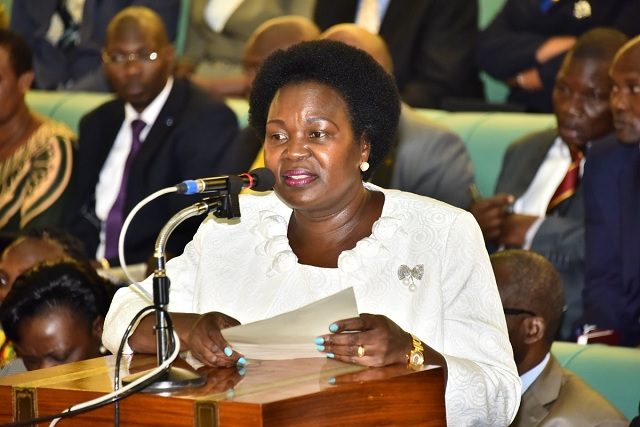
Government Chief Whip, Ruth Nankabirwa. PPU PHOTO.
Government Chief Whip, Ruth Nankabirwa has told Journalists that Parliament will not rush the Marriage and Divorce Bill because it is “so central to the institution of marriage” hence the need to “handle it with care.”
Speaking at Parliament on Wednesday, Nankabirwa said the “contentious piece of legislation is one that the Executive intends to push through Parliament on account of its importance.”
Nankabirwa assured media that legislators have no intentions of letting the marriage and divorce Bill gather dust on Parliament’s shelves for eternity.
“This is one of the Bills pending before the House. It’s a Bill that is so central to the institution of marriage and we have to handle it with care,” Nankibirwa said, according to a state-linked news daily.
The Marriage and Divorce Bill is one of the most debated laws in the history of Uganda, sources say, having languished in Parliament for almost 5 decades.
The Bill was initially called the Domestic Relations Bill, but was split into three which also include the Sexual Offences Bill, 2015, which was introduced and later withdrawn from the House, and the Muslim Personal Bill, which has never been introduced.
Ugandan lawyer and activist, Monica Godiva Akullo believes one of the main reasons why the Bill has been shelved every time it comes before Parliament is that it has faced stiff resistance from traditionalists, Muslims and Christians alike.
The Bill seeks to reform and consolidate the law relating to marriage, separation and divorce; to provide for the types of recognized marriages in the country and marital rights and duties.
It addresses issues like property, bride price and polygamy.
Critics believe the Bill in its current form distorts the Godly institution of marriage by ‘legalising’ cohabitation and ‘encouraging’ divorce.
Clause 144 of the bill provides for irretrievable break down of marriage as the only ground upon which a party may petition for the dissolution of that marriage.
It does away with the burden on the party petitioning for divorce to prove any wrong doing on the part of the other.
Parties only need to present sufficient evidence to convince the court that a marriage has irretrievably broken down. “This clause has faced some resistance with religious leaders claiming that it will weaken the institution of marriage,” says Monica Godiva Akullo, in her document on the status of the Bill.
The bill also provides for the different proprietary rights of the parties in cohabitation.
The bill recognises the institution of ‘bride wealth’ as legal although it provides that it shall not be ‘an essential requirement for any marriage under this act’ and that ‘it is an offence to demand for the return of a marriage gift.’
The Marriage and Divorce Bill recognizes polygamous marriages as lawful in Uganda.
Clause 3 (Interpretation) of the bill defines a ‘polygamous marriage’ as “a marriage in which the man is married to more than one wife,” and it goes on to define a potentially polygamous marriage as a marriage between a man and a woman in which the man has the capacity to contract another marriage during the subsistence of the first marriage, but has not yet done so.
The church is against among others the provision that recognize cohabitation after a given period, while the Muslim community didn’t want their marriage issues ‘mixed up’ with other marriage rites of other faith groups.
Clergy, including the ArchBishop of the Church of Uganda, Stanley Ntagali earlier called for wider consultations and sensitization of the masses since this is a bill that concerns the family which is the basic unit of society.
Currently, the New Vision reports, there are four different pieces of legislation in the making that are under this bill – each handling different types of marriages.
These include the Marriage Act for Christian and Civil marriages, the Hindu Marriage Act, the Marriage and Divorce of Mohammedans Act, and the customary marriage registration Act.

